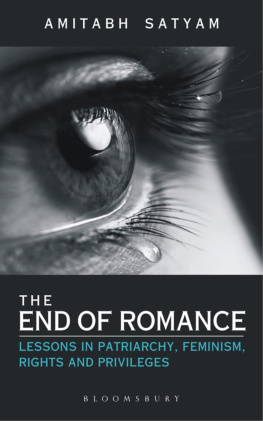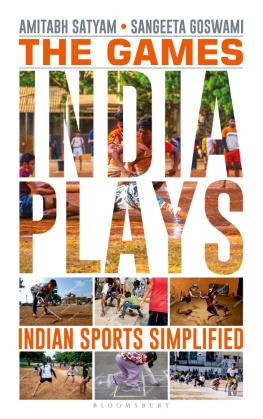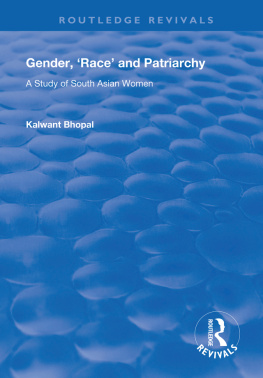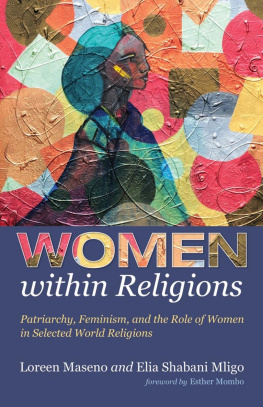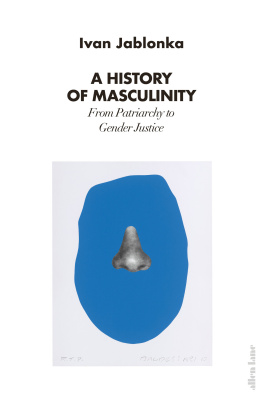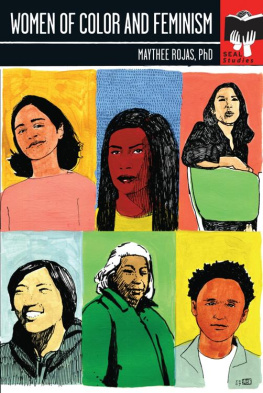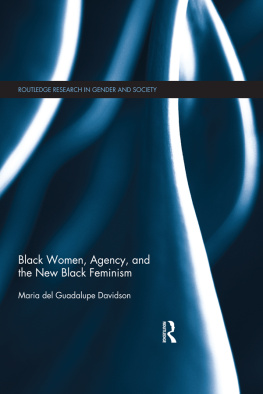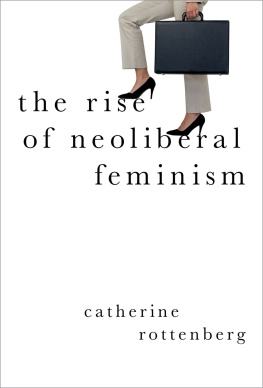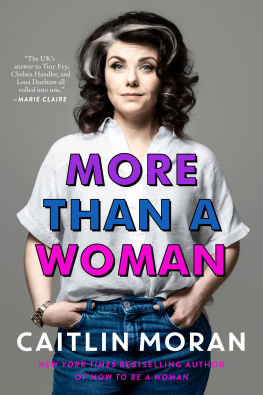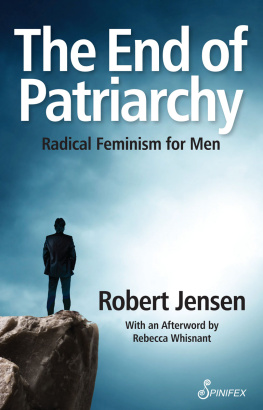Contents

The End of Romance
THE END
of
ROMANCE
Lessons in Patriarchy, Feminism,
Rights and Privileges
Amitabh Satyam

BLOOMSBURY INDIA
Bloomsbury Publishing India Pvt. Ltd
Second Floor, LSC Building No. 4, DDA Complex, Pocket C 6 & 7
Vasant Kunj, New Delhi 110070
BLOOMSBURY, BLOOMSBURY INDIA and the Diana logo are trademarks of Bloomsbury Publishing Plc
First published in India 2018
This edition published 2018
Copyright Amitabh Satyam, 2018
Illustrations Amitabh Satyam, 2018
Amitabh Satyam has asserted his right under the Indian Copyright Act to be identified as Author of this work
All rights reserved. No part of this publication may be reproduced or transmitted in any form or by any means, electronic or mechanical, including photocopying, recording, or any information storage or retrieval system, without prior permission in writing from the publishers
Bloomsbury Publishing Plc does not have any control over, or responsibility for, any third-party websites referred to or in this book. All internet addresses given in this book were correct at the time of going to press. The author and publisher regret any inconvenience caused if addresses have changed or sites have ceased to exist, but can accept no responsibility for any such changes
ISBN: 978-93-87863-98-9
2 4 6 8 10 9 7 5 3 1
Created by Manipal Digital Systems
[please check with production who will supply an FSC logo if appropriate, where no FSC logo is included please add the following text: Bloomsbury Publishing Plc makes every effort to ensure that the papers used in the manufacture of our books are natural, recyclable products made from wood grown in well-managed forests. Our manufacturing processes conform to the environmental regulations of the country of origin.]
To find out more about our authors and books visit www.bloomsbury.com and sign up for our newsletters
Section I
Chapter 1 introduces the topic of gender-relations and the societal biases. Chapter 2 discusses the man-woman relationship from the perspective of natural evolution and the progression of the two sexes over time. I will cover the forces that created a divide and the persistence of these forces.
The next two chapters focus on the status of women and men today in several societies in order to derive a common thread.
Section II
I will establish the key drivers of male-hatred and the institutionalisation of the current narratives of the man-woman relationship in chapter 5.
While women are projected as victims in many societies, I will establish that the gender differences are grossly exaggerated and women are equally capable of anger, manipulation, and violence in chapter 6. I will follow it up with a compilation of signs of abusive wives in chapter 7.
In chapter 8, I have compiled a list of the privileges and entitlements of women in India that discriminate against men.
An entire industry lives off these anti-men laws and chapter 9 describes the system that oils the extortions.
Section III
In such an adverse environment, I will discuss in chapter 10, the ways men should save themselves from accusations of crimes they have never imagined committing.
In chapter 11, I will present an analysis of a few myths that are fraudulently propagated to shame our culture. The man-woman relationship is at a critical juncture, to the point of causing an irreparable damage. I will discuss its implications on our lives in the charged atmosphere in chapter 12.
Section IV
We dream of a happier society that does not oppress any person. I conclude with observations that the oppressive societies are not sustainable.
In Epilogue, I have assembled a set of subjects that I discuss with my daughters, so they grow up to be responsible citizens and contribute to the family and the society.
I wish to express my gratitude to the following for their support with this publication.
The publishers at Bloomsbury, Praveen Tiwari and Nitin Valecha for an extraordinary partnership.
Sangeeta Goswami, a friend and an educator at Sri Life Global Foundation, for providing critical inputs and for reviewing the drafts.
Contents
The Mumbai local
A mid-teen boy raced to catch a moving train but got into the ladies compartment. He was carrying a torn bag and had probably come from Bihar or UP to seek employment. The moment his feet landed on the floor of the running train, a couple of ladies shouted, Get down, this is ladies! By the time he could gather his balance and pay attention, the train had gathered momentum.
A lady walked up to him and shouted at him. The kid was first confused but then understood quickly. Two more women joined the first one, demanding that he get out. He looked out to jump, but his legs appeared unwilling: the innate fear of death was stopping him. Then the women started pushing him. He was holding on to his bag and pulling away from the door. Finally, the ladies succeeded.
I saw him land. He rolled a few times, and after settling he looked up. He was alive. The ladies threw his bag out after pushing him. The train was either not as fast as I had thought, or the boy was just lucky.
Though everyone from the mens compartment watched, no one said anything. Maybe because the boy was poor. Maybe, the mistake was so outrageous that the ladies could not wait till the next stationMasjidthat was barely a kilometre away. Mumbai people are the nicest in the world, so I have not been able to explain this to myself. I guess it was an entitlement of women of some sort. Technically, the boy was wrong, so, who would defend him anyway?
I realised that common courtesy, generosity, and humanity had given way to entitlement.
*****
The streets of Bangalore
From the second floor of my favourite coffee place, I can witness the goings-on at the Bangalores busy Sony signal.
A courier boy stopped his motorcycle about twenty feet after the intersection. He was making a call, possibly to confirm if he could make the delivery. A few moments later, a woman turned into the same street, but could not manoeuvre her scooter, and hit the delivery-boys motorcycle. She fell down, together with the scooter. He too lost his balance with the impact, and his heavy bag fell down with his motorcycle.
The woman shouted at him, possibly due to embarrassment or nervousness. He came around to help lift her scooter. A few people had gathered and some of them shouted at him. He kept insisting that he was just standing there and did nothing wrong. One of the members of the crowd soon held him by his collar. The moment the boy raised his voice to protest, he was pushed harder, and later hurled to the ground, tearing his shirt in the process.
The woman was helped by other men and women as she checked for any scratches. She did not, however, intervene to stop the crowd from hurting the boy. After the woman drove away, the crowd dispersed. The boy continued sitting on the sidewalk staring at the sky and the ongoing traffic.
These boys often work fifteen-hour days to feed their families, and I hoped he would save enough to buy another shirt.
*****
The Kolkata bus
I was in Kolkata during 1986 for my summer training. On the city bus that I was travelling, an old man from a village boarded and found an aisle seat in the second row. A couple of stops later, two women got in. They were carrying books, so I assumed they were college students.

